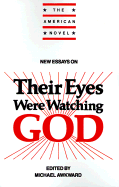Book contents
- Frontmatter
- Contents
- Series Editor's Preface
- 1 Introduction
- 2 The Personal Dimension in Their Eyes Were Watching God
- 3 “Crayon Enlargements of Life”: Zora Neale Hurston's Their Eyes Were Watching God as Autobiography
- 4 The Politics of Fiction, Anthropology, and the Folk: Zora Neale Hurston
- 5 Power, Judgment, and Narrative in a Work of Zora Neale Hurston: Feminist Cultural Studies
- Notes on Contributors
- Selected Bibliography
3 - “Crayon Enlargements of Life”: Zora Neale Hurston's Their Eyes Were Watching God as Autobiography
Published online by Cambridge University Press: 01 March 2011
- Frontmatter
- Contents
- Series Editor's Preface
- 1 Introduction
- 2 The Personal Dimension in Their Eyes Were Watching God
- 3 “Crayon Enlargements of Life”: Zora Neale Hurston's Their Eyes Were Watching God as Autobiography
- 4 The Politics of Fiction, Anthropology, and the Folk: Zora Neale Hurston
- 5 Power, Judgment, and Narrative in a Work of Zora Neale Hurston: Feminist Cultural Studies
- Notes on Contributors
- Selected Bibliography
Summary
The plot was far from the circumstances, but I tried to embalm all the tenderness of my passion for him in Their Eyes Were Watching God.
What Zora took from this relationship was the quality of its emotion; its tenderness, its intensity, and perhaps its sense of ultimate impossibility. … The man she was leaving … was left hurt and confused, wondering if she was “crying on the inside.” She gave him her answer in Their Eyes Were Watching God.
EVERYONE who knows anything about Zora Neale Hurston knows that Their Eyes Were Watching God is not her autobiography. Yet the novel is autobiographical on two levels. First, in a continuation of one of the oldest traditions in fiction, Janie tells us the story of how and why her life came to be in the place that it is; second, we also know that Hurston invested this narrative with the joy and pain of her own experiences of female development and romantic love, familiar conventions in women's narratives. Thus, Their Eyes Were Watching God offers an opportunity to examine the autobiographical impulse from the perspectives of author Hurston, the writerly self, and fictional Janie, the speakerly self, creating a common text delineating a black female self-in-writing. In their combined oral and written narrative, Hurston and Janie reinforce Janet Varner Gunn's theory of the autobiographer as self-reader, writing (and speaking) from the “outside in, not inside out – or in other words, from the position of the other side of [the] lived past which the reader-self occupies” at the time of writing.
- Type
- Chapter
- Information
- New Essays on Their Eyes Were Watching God , pp. 51 - 70Publisher: Cambridge University PressPrint publication year: 1991
- 3
- Cited by



